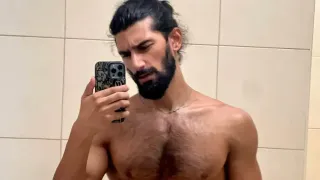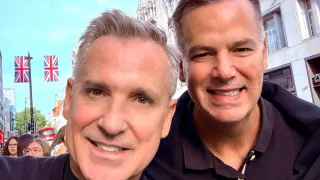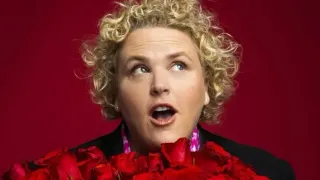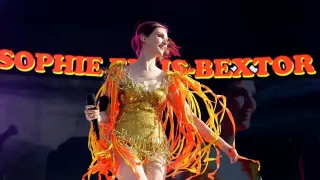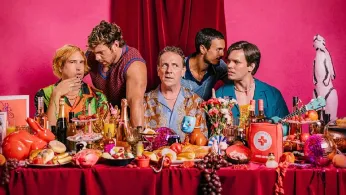
3 hours ago
EDGE Interview: Murder, Brunch, and a Jonathan Adler Credenza - Drew Droege’s 'Messy White Gays' Makes a Sunday in Hell’s Kitchen Hilariously Homicidal
Steve Duffy READ TIME: 4 MIN.
In "Messy White Gays," Drew Droege—the sharp-penned and quick-witted diarist of the contemporary homosexual—shines a harsh overhead light on the pores of White Gaydom, revealing what happens when throuples crumble, neighbors bicker, and rich and pretty clash with hot and dumb. It’s Sunday morning in Hell’s Kitchen. Brecken and Caden have just murdered their boyfriend and stuffed his body into a Jonathan Adler credenza. Unfortunately, they’ve also invited friends over for brunch. And they’re out of limes! Feel bad for them! They’re MESSY WHITE GAYS!
Before the body’s cold and the brunch is ruined, we caught up with Drew Droege to dish on murder, messiness, and why white gay brunch culture might just be the real crime.
EDGE: You’ve mentioned that Messy White Gays was born partly out of frustration with certain behaviors in white gay spaces. How did that frustration crystallize into a story about murder and brunch?
DD: Great question. I saw a lot of white gays with good intentions saying a lot of the right things, but not doing them. I was also placing myself on blast, and I was frustrated about what to do. I've been to many parties where everyone there is a gay white man and very few BIPOC people, women, and trans people. We all claim to be fans of all of those things, but we don't actually live our lives that way. I believe we also feel like we understand all layers of oppression as gay men, but we also forgot that we are white men walking through the world, and we don't know what it's like to be one, even though we are gay as well. I had written another play that took place before a gay wedding in Palm Springs, and I wrote another one that took place during a gay birthday party in LA. Then I thought about a murder in New York. So, it all just sort of came together, and thinking about how we dispose of each other in culture after we have gotten what we need from each other.
EDGE: How much of the play’s world — the Hell’s Kitchen brunch setup, for example — is based on things you’ve observed or experienced?
DD: I love coming to Hell's Kitchen, and so I've always been a fan of it. The references are all real places that I've visited. I have luckily never been part of a murder, and I don't know of any dead bodies in any apartments that I've been in, but the characters are all archetypes. None of them is based on specific people that I know. And even my own character is the least autobiographical character that I've written for myself. But I also wanted to be the bitch, so that was fun.
EDGE: The tone is darkly comedic. How do you approach writing humor in scenes that also deal with serious issues?
DD: In the beginning, I did quite a few readings, and I got a lot of feedback that it was grim, and a lot of people were saying, It feels like Party Monster, and it felt like a serial killer story and that is not what I wanted. So, I kept playing around with tone until I got it right. I also found when you're doing farce and satire, you're playing these characters who are larger than life, so you have to be able to laugh at the characters and it has to be funny first and then you hope there's a message in there without waving your finger at the audience trying to make them understand certain things. You have to win them over with laughter. So you try out a lot of things. A couple of times, I wanted to write a lot of characters who were all problematic, but none of them were aware of their racism or their transphobia. I felt like if they were too aware, it would be too easy. And it's not fun to laugh at someone who knows they're awful. It took a lot of experimenting to see at what point people say things without realizing how awful they sound, but they mean well. That's more interesting to me to critique that than somebody who's a MAGA, which is not fun for me.
EDGE: How did you know James Cusati-Moyer, Aaron Jackson, Derek Chadwick, and Pete Zias were the right “messy gays” to bring this world to life?
DD: Every single one is perfectly cast. I'll just say Pete is one of my best friends, and I didn't realize I had written this part for him. I wrote it with a different type of person in mind, not even a specific person, but he came and did one of the earliest readings, and I knew it had to be him. Every other actor has come to the cast in that way, except for Derek, who is a last-minute replacement. Derek joined the show a week before rehearsal started, and he walked in the door, and we just said, That's our Addison. Everyone has arrived in different ways and at various stages of development. They showed up, and they continue to teach me about who these people are in every rehearsal. As the writer, it has been fun to let them collaborate and create these roles with me.
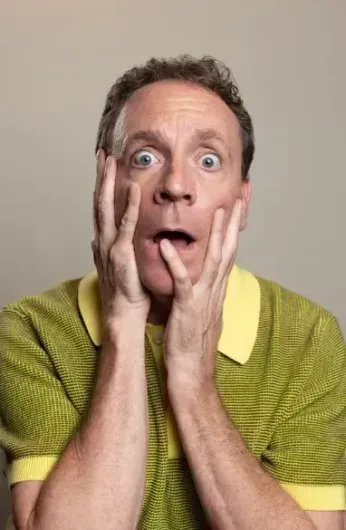
Source: Marc J. Franklin
EDGE: Which cast member is most likely to “accidentally” slip into character during a real brunch outing?
DD: Oh, me. I could be the one with the sassy mouth. I could really roll my eyes at new ideas. I have to constantly remind myself to open my mind, take a deep breath, and relax. I hope I'm not too much like this character that I'm playing, but there's a lot of me in him.
EDGE: If you could add one celebrity cameo to the cast, who would it be — and what messy role would they play?
DD: I would absolutely love to see Nathan Lane play my part. That would be a dream come true, but only if I were sick.
EDGE: In writing a play so explicitly critical of “white gay men,” did you wrestle with guilt or self-critique as a writer in that same community?
DD: Yes, I did. I wanted to skewer all of us very much. I'm trying to think because I don't want to spoil too much about the flame, but I definitely didn't want to look like there was an easy way out. As the writer, I didn't want to come across as the hero. I hope people think I might be that at some point. This may sound a little vague, but I thought the best way to navigate all of this is to expose everyone, including myself. All of these characters are fictional, but they have represented me in different ways at various times. So, I've caught myself saying really cringey white savior things, trying to sound like a really good person. I thought, what if those rules these characters? What if another character says, 'I don't care if I'm politically correct; if I said something awful, just deal with it'? It's sort of taking your own awkward and horrible moments and exploding them while putting a hat on it and creating a character.
EDGE: As someone who has a crush on Daniel Craig. What was it like working with him on the film Queer?
DD: He is the kindest, most incredible actor and human being. He is so much fun to work with. He takes all your fears away. I was touched and honored to work with Luca Guadagnino and all the other incredible actors. I don't get to do films like that often, so it was an amazing experience. I also had to play this really bitchy queen and give James Bond a bunch of shit, and I had to get up in his face and be awful to him, but he took care of me. No matter what scene we were working on, he was the one always asking, 'How do we make this better? How can I help you? Or what do you need from me?' He is such a great actor for other actors to work with. He's there to work, but he's also playful, fun, curious, and kind. I've always been a fan of his work, but after working with him. I am a fan for life.
EDGE: What do you hope Messy White Gays contributes to queer theatre?
DD: I hope it will make people laugh and that we are able to laugh at ourselves and hopefully see ourselves in some of these characters. I've always heard that comedy's a social corrective. When you laugh at bad behavior, you learn not to be that way in real life. I hope it's a cautionary tale for people to say, “Oh, maybe that has been us and now let’s change.” I've always aspired to write gay plays with gay people talking the way my gay friends and I talk to each other. I think some of the greatest playwrights of the 20th century were gay men, but they didn't write for gay characters until Terrence McNally and Tony Kushner came along. So many of the great playwrights before that did not write gay characters, but they wrote about women or really tortured butch guys who might have a same sex attraction, but they were never queens. They were not us. McNally and Kushner started writing that way in the eighties and nineties. And then of course, Harvey Firestein, who wrote plays that were for us by us. I've grown up looking to them and wanting to write about how we talk and act. The greatest compliments that I have received is when people tell me that they sounds like me and my friends when we are together. The fun part about having out with your gay friends is the chaos and the frivolity of it all and the great times that you will have.
Messy White Gays debuted at The Duke on 42nd Street on October 6, 2025, with opening night set for November 2nd . Tickets are now available at www.messywhitegays.com
